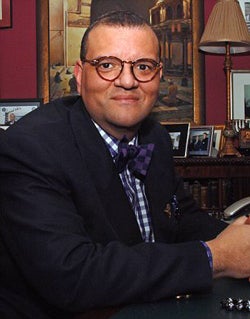On October 21, Canon Andrew White delivered a lecture titled “Pursuing Reconciliation in Iraq: The Art of Mediation Between Warring Religious Factions.” Co-sponsored by the Human Rights Program and the Carr Center for Human Rights Policy at the Kennedy School, the lecture focused on the role that religion must play in the peacemaking process in the Middle East.
White is president of the Foundation for Reconciliation in the Middle East, and the Anglican Chaplain to Iraq and Rector of St. George’s Church in Baghdad. The recipient of the Train Foundation’s Civil Courage Prize, White has been involved in the release of more than 50 hostages in the Middle East.
“Although I’m supposedly a religious leader myself, I actually think religion is bad,” he said. “So much of what we’ve seen is religion going wrong, and causing hatred and damage and pain.”
Nonetheless, he said that religion must be a serious consideration if peace in the Middle East is to be an achievable goal, because he has never known of a country in that region where religion was not extraordinarily significant.
White, a founder of the Baghdad Religious Accord and the Iraqi Institute of Peace, says he has learned from his work that grassroots mobilization does not have as large of an impact as it does in Western nations, so in order to bring religious accord, change has to come from the top. It became obvious to White that leaders with very particular backgrounds must work together to create lasting social change. He said that a working coalition will need religious leaders, people with political influence, those who garner significant media attention and, surprisingly, terrorists.
“When we talk about inter-religious work in the West, it’s usually nice people sitting down with nice people. In Iraq, it’s nice people among bad people,” White said. “If you’re trying to make peace, you can’t only work with the nice people. The people that can make a difference are the not the nice people. I’ve had to spend hours with some of the bad people, and they do bad things because they feel they have lost something. So much of terrorism is actually about loss. Those who have lost money, property, influence – in essence it’s about the loss of power. So you have to be able to give something back to them.”
He acknowledged that there are some groups with whom it is simply fruitless to engage. Groups like Al Qaeda, for example, can only be dealt with through military action. White said that he is remarkably pro-military for a religious leader.
White concluded that democracy does not work in the Middle East and that Western attempts to impose democracy will only fail. He proposes a benevolent dictatorship instead, using the success of the Jordanian and Moroccan monarchies as examples.
“I don’t like trying to impose a western mindset on a different kind of nation. It’s very important that we realize that we’re dealing with a totally different mindset,” he said.
